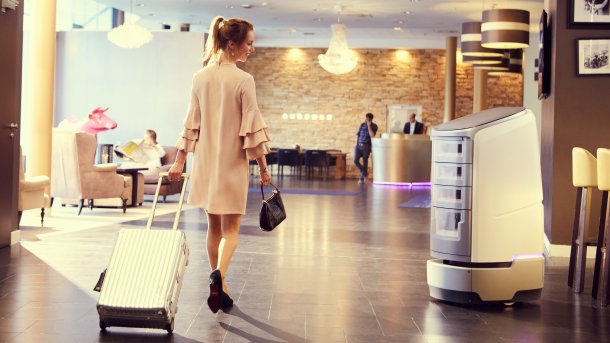Study: Robot phobia leads to more redundancies in the hospitality industry
Robots in hospitality aim to address labor shortages. However, a study finds that robot adoption leads to increased layoffs.

A robot works in a hotel.
(Image: Robotise)
The use of robots in the hospitality industry to compensate for the shortage of skilled workers there could backfire. A study by Washington State University (WSU) has identified a certain degree of robot phobia among employees in the hospitality industry, which could lead to an increase in workers resigning of their own accord.
The researchers surveyed 621 employees in the hospitality industry in their study, "Are robots stealing our jobs? Examining robot-phobia as a job stressor in the hospitality workplace", which was published in the International Journal of Contemporary Hospitality Management. The survey revealed that people have a kind of robot-phobia, which manifests itself in people being afraid of being replaced by robots and technology in general. This uncertainty about the future of their own job and the associated stress leads to an increasing willingness among employees to give up their jobs. The more contact employees have with robots in their day-to-day work, the stronger the feeling of job insecurity caused by this. Even increasing familiarity with the technology could not allay employees' fears. According to the researchers, this affects not only normal employees within the hospitality industry, but also managers.
"The turnover rate in the hospitality industry is among the highest of any sector outside of agriculture, so this is an issue that companies need to take seriously," said Bamboo Chen, lead author of the study and hospitality researcher at WSU's Carson College of Business.
"The results seem to be consistent across all sectors and for both employees and managers. For everyone, regardless of their position or industry, robot phobia has real effects."
Videos by heise
"Negative feedback loop"
Robots or automation in the hospitality industry in general could ensure that unpleasant tasks, such as washing dishes and other cleaning tasks, are no longer necessary, freeing up employees for more interesting tasks. However, there is a risk of a "negative feedback loop". Employees could quit and thus even exacerbate the shortage of skilled workers in the hospitality industry. Chen therefore sees the need to communicate more with his own employees and show them the limits of robot technology and automation, for example, as well as emphasizing the importance of people in the hospitality industry.
"When you introduce a new technology, don't just focus on how good or efficient it will be. Instead, focus on how people and technology can work together," says Chen.
(olb)